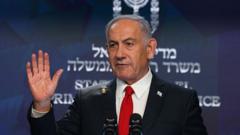Recent mass layoffs at the United States Agency for International Development have raised alarms about the future of U.S. humanitarian efforts, prompting scrutiny of Marco Rubio's leadership as Secretary of State.
Mass Firings at U.S. Aid Agency Spark Controversy Over Humanitarian Support

Mass Firings at U.S. Aid Agency Spark Controversy Over Humanitarian Support
Hundreds of employees at USAID have been dismissed amid questions regarding Secretary of State Marco Rubio's commitment to humanitarian services.
The recent firings of hundreds of employees at the United States Agency for International Development (USAID) have ignited significant concern regarding the agency’s ability to manage urgent humanitarian aid. Reports indicate that appointees from the Trump administration, under Secretary of State Marco Rubio's oversight, executed the dismissals, leading to skepticism about the administration's commitment to critical humanitarian assistance.
According to sources within the agency, the dismissals were predominantly from the Bureau for Humanitarian Assistance. This round of layoffs included generic mass emails sent to affected employees, lacking specific details, which has drawn criticism for the impersonal and abrupt nature of the communication. Some employees received termination notices without any identification of their job titles or personal address, just as the agency undergoes scrutiny for being embroiled in political machinations.
The suspicions regarding Rubio’s support are exacerbated by his previous promises made last month during a temporary halt on nearly all foreign aid disbursements. Many within the agency fear that these layoffs signify a broader agenda that undermines the urgency of humanitarian efforts globally, contradicting the stated priorities of providing lifesaving assistance.
Adding to the turmoil, reports reveal that a task force led by engineers associated with tech entrepreneur Elon Musk has impacted operational functionality within USAID, exacerbating the losses of personnel dedicated to international aid work. Musk's controversial social media assertions, where he has dubbed the agency a "criminal organization," further complicate the political atmosphere surrounding these recent actions.
The fallout from these dismissals extends to specialized units within the agency, including the Office of Transition Initiatives, which saw significant staff reductions aimed at fostering democratic processes in partner countries. These changes come at a time when the need for humanitarian support is greater than ever, raising essential questions regarding the future strategies of USAID under its current leadership.
According to sources within the agency, the dismissals were predominantly from the Bureau for Humanitarian Assistance. This round of layoffs included generic mass emails sent to affected employees, lacking specific details, which has drawn criticism for the impersonal and abrupt nature of the communication. Some employees received termination notices without any identification of their job titles or personal address, just as the agency undergoes scrutiny for being embroiled in political machinations.
The suspicions regarding Rubio’s support are exacerbated by his previous promises made last month during a temporary halt on nearly all foreign aid disbursements. Many within the agency fear that these layoffs signify a broader agenda that undermines the urgency of humanitarian efforts globally, contradicting the stated priorities of providing lifesaving assistance.
Adding to the turmoil, reports reveal that a task force led by engineers associated with tech entrepreneur Elon Musk has impacted operational functionality within USAID, exacerbating the losses of personnel dedicated to international aid work. Musk's controversial social media assertions, where he has dubbed the agency a "criminal organization," further complicate the political atmosphere surrounding these recent actions.
The fallout from these dismissals extends to specialized units within the agency, including the Office of Transition Initiatives, which saw significant staff reductions aimed at fostering democratic processes in partner countries. These changes come at a time when the need for humanitarian support is greater than ever, raising essential questions regarding the future strategies of USAID under its current leadership.




















